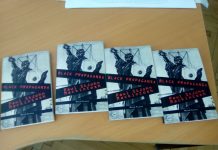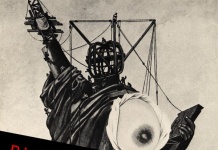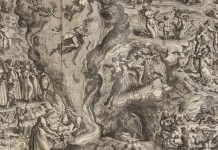 Regular TeleRead readers will probably have tumbled by now to the recent series of Faber and Faber reprints and recompilations of stories by the brilliant, enigmatic, and influential British writer of strange stories, Robert Fordyce Aickman. Cold Hand in Mine is probably the jewel of the series, as well as perhaps the best single-volume introduction to the writer’s work. Originally republished in the Faber Finds series, these eight stories from the middle period of Aickman’s career, selected by him, showcase some of his most diverse and imaginative productions, including “Pages from a Young Girl’s Journal,” which won the World Fantasy Award with its fusion of Jane Austenesque diarism with vampirism. That, however, is the nearest thing to a conventional horror story among the tales, only four of which have the genteel English male protagonists that readers of Aickman are used to. The stories range from an unnamed Channel Island to Second Empire Germany, taking in along the way some very dark territory indeed – as in “The Real Road to the Church,” with its mysterious psychodrama of bereavement and self-evaluation, or the creepy childhood trauma and (psychic?) molestation of “The Same Dog.”
Regular TeleRead readers will probably have tumbled by now to the recent series of Faber and Faber reprints and recompilations of stories by the brilliant, enigmatic, and influential British writer of strange stories, Robert Fordyce Aickman. Cold Hand in Mine is probably the jewel of the series, as well as perhaps the best single-volume introduction to the writer’s work. Originally republished in the Faber Finds series, these eight stories from the middle period of Aickman’s career, selected by him, showcase some of his most diverse and imaginative productions, including “Pages from a Young Girl’s Journal,” which won the World Fantasy Award with its fusion of Jane Austenesque diarism with vampirism. That, however, is the nearest thing to a conventional horror story among the tales, only four of which have the genteel English male protagonists that readers of Aickman are used to. The stories range from an unnamed Channel Island to Second Empire Germany, taking in along the way some very dark territory indeed – as in “The Real Road to the Church,” with its mysterious psychodrama of bereavement and self-evaluation, or the creepy childhood trauma and (psychic?) molestation of “The Same Dog.”
Some of the most interesting material in this volume, though, is not the author’s own work at all, but the biographical “Memories of a Friend: An Afterword” by Jean Richardson, which gives a fascinating sidelight on Aickman the man – fascinating, but not necessarily revelatory, because it confirms that he was just the socially and emotionally handicapped product of fastidious but decaying English gentility that you could expect from his writing. Yes, it is a surprise to hear that “a trophy girlfriend was what Robert thought he deserved,” but it is not so surprising to hear him say of himself that “the proper course of my life has gone completely astray, and regret and melancholy crop up unpredictably.” Or that, ever the artist, he was “not really interested in turning art into commerce.” In fact, when mapping out his own creative position, Aickman wrote that:
It seems to me that, on the one hand, are what we may term the entertainers, who, to the best of their ability and experience, write to please a specific market; while, on the other, are the artists, who do not, and indeed cannot, proceed like that at all, but write in response to a voice inside them which they cannot control beyond a certain point – which, indeed, almost dictates to them, an experience that has several times come my way, and which regularly produces one’s best work (such as “Pages from a Young Girl’s Journal”).
Aickman was apparently as helplessly unworldly and out of touch with his time (and with emotional life) as any Aickman “hero,” but at least whatever warped his world out of true granted him insight into layers of human personality that few others ever touch, as well as the artistic gifts to articulate this through darkly crystalline prose. In “Niemandswasser,” he comes close to framing the nature of this insight explicitly in the words of Spalt, the village schoolmaster who counsels the doomed young Prince Albrecht von Allendorf, as the latter approaches his last, horrific confrontation with the unknown. “We are most of us two people, your Highness. There is something lacking in the man who is one man only, and so, as he believes, at peace with the world and with himself … And the two people within us seldom communicate. Even when both are present together in consciousness, there is little communication. Neither can confront the other without discomfort.”
Aickman, via Spalt, concluded that: “Life, as we know it, could hardly continue if men did not soon slay the dreamer inside them.” But somehow, Aickman kept the dreamer inside (barely) alive, and produced inimitable strange stories in the process. Essential reading.



































Here is how Aickman might have retold “The Three Bears”: http://normals.tumblr.com/post/34434738411/those-same-bears-something-for-fans-of-robert